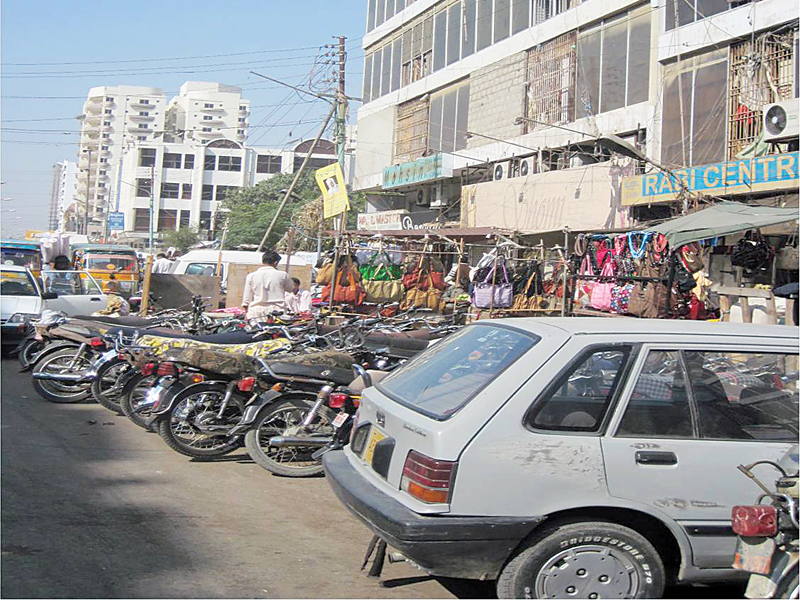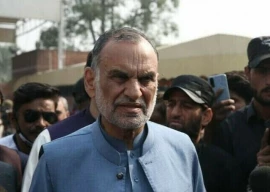
Turn right at Noorani Kebab House and drive down the street. To your left and right you will find car showrooms with their wares spilling out onto the road. People are slowly moving out of this neighbourhood. The stately old homes with their high ceilings, rounded balconies and verandahs and cream facades are being torn down by builders with the aesthetic sense of a bulldozer.
What you see is the effect of a decision the City District Government Karachi (CDGK) took in 2004. It made a major policy intervention by commercialising 17 of the major traffic corridors. It was made official in the CDGK Change of Land Use and Master Planning Bye-Laws 2003, signed into effect on February 12, 2004. This decision unleashed a disease that has spread throughout the city to eat away at our quality of life.

It added a chapter to the story of Karachi's damage caused by unregulated commercialisation of land parcels. Commercialisation converts the existing category of land use from residential or amenity (parks) or recreation to commercial.
What was even more catastrophic was the type or form of commercialisation that was approved that year. It is called 'ribbon commercialisation' in which strips of land along major traffic corridors are opened for business instead of a much better option of 'block commercialisation'. In block commercialisation you first check civic utilities, the impact on traffic volumes, environmental and social repercussions.
A committee of independent experts put together by the Karachi Development Authority had said they were opposed to the ribbon commercial development. They argued that in addition to having an undesired impact on the main corridors, these developments would ultimately penetrate inward and have a bad effect on the neighbourhoods.
When KDA conducted a public opinion survey in PECHS at the time, 80% of residents polled opposed commercialisation.
Exactly what was feared has happened. Take the once purely residential neighbourhoods next to Khalid bin Waleed Road, Sir Syed Road. Car showrooms have not only blocked half the traffic arteries on both sides but have also barricaded the entrances to side roads to increase their parking space. Further inwards, you will see all kinds of unplanned and undesirable commercialisation in the shape of offices, tuition centres, beauty parlours.
NGO Shehri recently surveyed what people thought of the commercialisation along five of the 17 corridors. Some major concerns were a degradation of the aesthetics or beauty of the place, loss of green spaces and vegetation (read trees), encroachment of public and private spaces, loss of privacy and increase in crime. Citizens were asked to rate their most pressing worries on a scale of one to 10. Interestingly, Shehri found that three consequences, related directly to an increase in traffic, scored the highest. They were degradation of air quality (78%), increase in noise levels (76%) and increase in traffic volumes (72%). You can add to these businesses and activities where noise is created and smoke is emitted such as restaurants, maintenance workshops of different kinds etc.
The residents said that the worst commercial activity were the car showrooms (44%) and petrol pumps or CNG stations. Roadside restaurants also scored high on negativity (30%) though there were some variations from one corridor to another. Encroachments on pavements and open spaces mean that pedestrian movement has been severely restricted.
The writer is an urban planner and runs a non-profit organization based in Karachi city focusing on urban sustainability issues. He can be reached at fanwar@sustainableinitiatives.org.pk
Published in The Express Tribune, October 14th, 2013.
COMMENTS (9)
Comments are moderated and generally will be posted if they are on-topic and not abusive.
For more information, please see our Comments FAQ
1730793476-0/bella-(1)1730793476-0-405x300.webp)

1723119450-0/jlo-ben-(6)1723119450-0-165x106.webp)

1730270970-0/BeFunky-collage-(84)1730270970-0-165x106.webp)



1730786905-0/£300,000-(1)1730786905-0.png)






1730706072-0/Copy-of-Untitled-(2)1730706072-0-270x192.webp)
What a crap? At some point commersialization would happen when your population grow, especially on main artery like Khalid bin Walid road, it more to do with Polce and local govt. not forcing these car showroooms to obey the law. I remember few years back where all the car showroom owners were forced to remove the cars park outside and they had to remove it. It is all about following and implementation of law. When yo udont get many according to the protion you desrve govt would find other venues, you may like some and saome you may not.
Seriously? Are you guys going to blame this on Mustafa Kamal...in 2004? how about just typing Mustafa Kamal in google to find out when he started his mayoral term? Shocker for you all- he started in 2005 till 2010. Maybe you guys want to say he was in power, he should have at least stopped it? OK. but how many authorities have given to him? do you mind checking? But by that rule, you can blame this to CM Sindh...right? But No... its hard for you to think that much, and easy to blame every inch of karachi on MQM (knowing clearly- that it never got full authority for its mandate). God Bless...thank god bb did not died in Karachi..otherwise.... ET: since you have publish others, mine needs to be here also
@Syed Ali Raza Abidi: The least you can do is clear up the cars parked by showrooms on Khalid bin Waleed road... let's see if you can do that without forming a committee and having lenghty, time-wasting discussions. For help you can ask Mustafa Kamal bhai, he had the guts to do it back in 2004-2005. The residents will appreciate that.
@Hasan and @Ali in 2004 Nazim Karachi and Jamshed Town Nazim were both from Jamat e Islami, Mustafa Kamal became Nazim in 2005 so it was Jamat e Islami who is responsible of this mess but as usual if you guyz wants to blame MQM for everything its your choice.
The problems of this city have grown out of abilities of the politicians.
@Syed Ali Raza Abidi: If you're the elected MNA, why do we only see you online forums and not in the area doing some work for the people?
Noted - The resident committees can set up an appointment to discuss this issue in detail with me, being the area's elected MNA.
We know as urban centers all over the country usually filling in with people, so does the demand for economic activity, Where these decisions has benefited the residents who slept of double the rates as the locations were commercialized, it has surely affected those who were not on the main streets.